英语状语从句的翻译
- 格式:ppt
- 大小:84.50 KB
- 文档页数:20
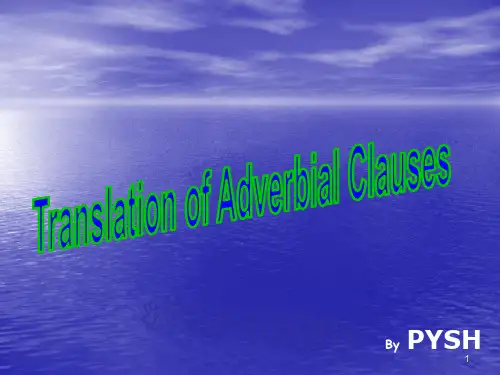
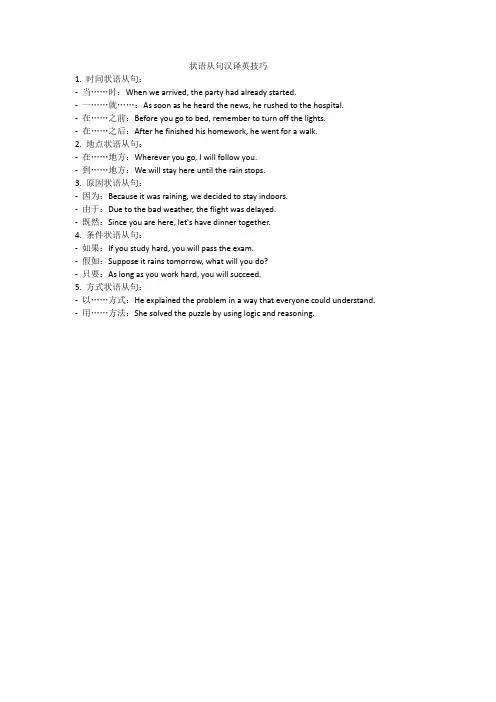
状语从句汉译英技巧1. 时间状语从句:-当……时:When we arrived, the party had already started.-一……就……:As soon as he heard the news, he rushed to the hospital.-在……之前:Before you go to bed, remember to turn off the lights.-在……之后:After he finished his homework, he went for a walk.2. 地点状语从句:-在……地方:Wherever you go, I will follow you.-到……地方:We will stay here until the rain stops.3. 原因状语从句:-因为:Because it was raining, we decided to stay indoors.-由于:Due to the bad weather, the flight was delayed.-既然:Since you are here, let's have dinner together.4. 条件状语从句:-如果:If you study hard, you will pass the exam.-假如:Suppose it rains tomorrow, what will you do?-只要:As long as you work hard, you will succeed.5. 方式状语从句:-以……方式:He explained the problem in a way that everyone could understand. -用……方法:She solved the puzzle by using logic and reasoning.。
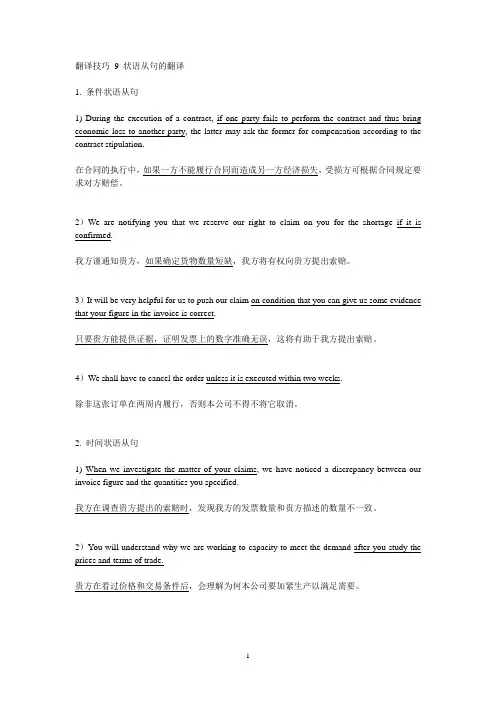
翻译技巧9 状语从句的翻译1. 条件状语从句1) During the execution of a contract, if one party fails to perform the contract and thus bring economic loss to another party, the latter may ask the former for compensation according to the contract stipulation.在合同的执行中,如果一方不能履行合同而造成另一方经济损失,受损方可根据合同规定要求对方赔偿。
2)We are notifying you that we reserve our right to claim on you for the shortage if it is confirmed.我方谨通知贵方,如果确定货物数量短缺,我方将有权向贵方提出索赔。
3)It will be very helpful for us to push our claim on condition that you can give us some evidence that your figure in the invoice is correct.只要贵方能提供证据,证明发票上的数字准确无误,这将有助于我方提出索赔。
4)We shall have to cancel the order unless it is executed within two weeks.除非这张订单在两周内履行,否则本公司不得不将它取消。
2. 时间状语从句1) When we investigate the matter of your claims, we have noticed a discrepancy between our invoice figure and the quantities you specified.我方在调查贵方提出的索赔时,发现我方的发票数量和贵方描述的数量不一致。
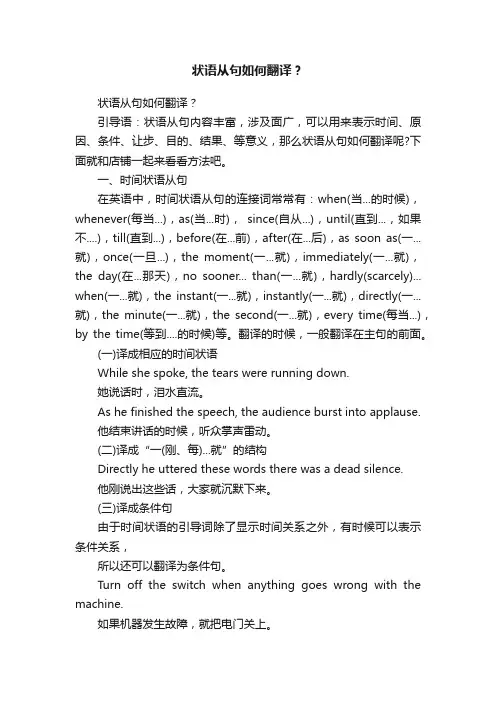
状语从句如何翻译?状语从句如何翻译?引导语:状语从句内容丰富,涉及面广,可以用来表示时间、原因、条件、让步、目的、结果、等意义,那么状语从句如何翻译呢?下面就和店铺一起来看看方法吧。
一、时间状语从句在英语中,时间状语从句的连接词常常有:when(当...的时候),whenever(每当...),as(当...时),since(自从...),until(直到...,如果不....),till(直到...),before(在...前),after(在...后),as soon as(一...就),once(一旦...),the moment(一...就),immediately(一...就),the day(在...那天),no sooner... than(一...就),hardly(scarcely)... when(一...就),the instant(一...就),instantly(一...就),directly(一...就),the minute(一...就),the second(一...就),every time(每当...),by the time(等到....的时候)等。
翻译的时候,一般翻译在主句的前面。
(一)译成相应的时间状语While she spoke, the tears were running down.她说话时,泪水直流。
As he finished the speech, the audience burst into applause.他结束讲话的时候,听众掌声雷动。
(二)译成“一(刚、每)...就”的结构Directly he uttered these words there was a dead silence.他刚说出这些话,大家就沉默下来。
(三)译成条件句由于时间状语的引导词除了显示时间关系之外,有时候可以表示条件关系,所以还可以翻译为条件句。
Turn off the switch when anything goes wrong with the machine.如果机器发生故障,就把电门关上。
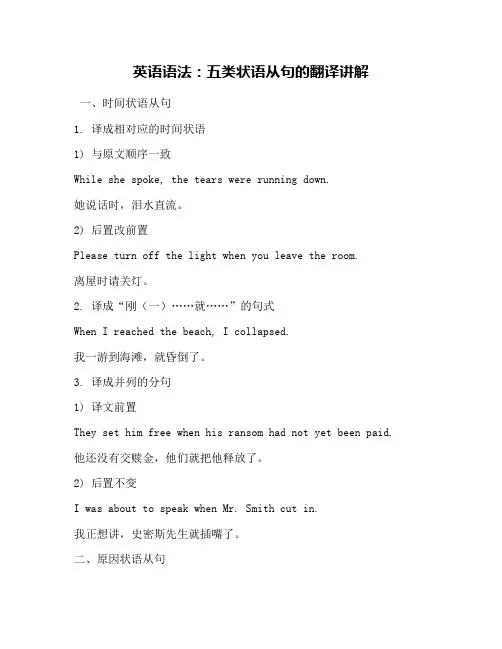
英语语法:五类状语从句的翻译讲解一、时间状语从句1. 译成相对应的时间状语1) 与原文顺序一致While she spoke, the tears were running down.她说话时,泪水直流。
2) 后置改前置Please turn off the light when you leave the room.离屋时请关灯。
2. 译成“刚(一)……就……”的句式When I reached the beach, I collapsed.我一游到海滩,就昏倒了。
3. 译成并列的分句1) 译文前置They set him free when his ransom had not yet been paid.他还没有交赎金,他们就把他释放了。
2) 后置不变I was about to speak when Mr. Smith cut in.我正想讲,史密斯先生就插嘴了。
二、原因状语从句1. 译成表“因”的分句1) “因”在“果”之前The crops failed because the season was dry.因为气候干旱,作物歉收。
2) “果”在“因”之前She could get away with anything, because she looked such a baby.她能渡过任何风险,因为她看上去简直还像娃娃模样。
2. 译成因果偏正复句中的主句Pure iron is not used in industry because it is too soft.纯铁太软,所以不用在工业上。
Because he was convinced of the accuracy of this fact, he stuck to his opinion.他深信这件事准确可靠,所以坚持己见。
3. 译成无关联词的因果关系并列分句Where there is sound, there must be sound waves.哪里有声音,哪里就必有声波。
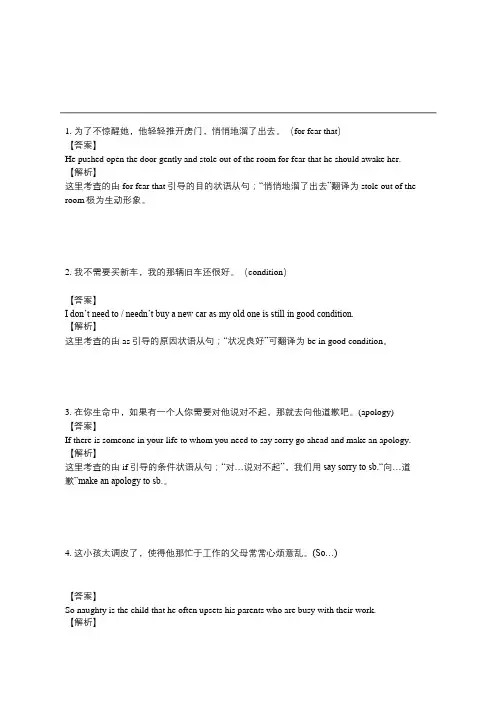
1. 为了不惊醒她,他轻轻推开房门,悄悄地溜了出去。
(for fear that)【答案】He pushed open the door gently and stole out of the room for fear that he should awake her.【解析】这里考查的由for fear that引导的目的状语从句;“悄悄地溜了出去”翻译为stole out of the room极为生动形象。
2. 我不需要买新车,我的那辆旧车还很好。
(condition)【答案】I don’t need to / needn’t buy a new car as my old one is still in good condition.【解析】这里考查的由as引导的原因状语从句;“状况良好”可翻译为be in good condition。
3. 在你生命中,如果有一个人你需要对他说对不起,那就去向他道歉吧。
(apology)【答案】If there is someone in your life to whom you need to say sorry go ahead and make an apology.【解析】这里考查的由if引导的条件状语从句;“对…说对不起”,我们用say sorry to sb.“向…道歉”make an apology to sb.。
4. 这小孩太调皮了,使得他那忙于工作的父母常常心烦意乱。
(So…)【答案】So naughty is the child that he often upsets his parents who are busy with their work.【解析】这里考查的是so…that引导的结果状语从句,千万要注意,so位于句首要用不完全倒装形式。
5. 自从出国留学后,她就不再和我们保持联系了。
(No longer)【答案】No longer has she kept in touch with us since she went abroad for further study / education.【解析】这里考查的是since引导的时间状语从句;与……保持联系keep in touch with;注意no longer位于句首,主句要使用部分倒装结构。
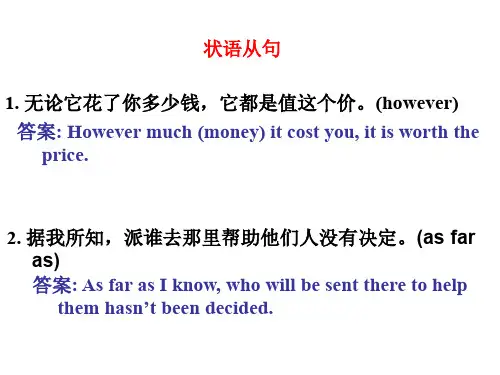
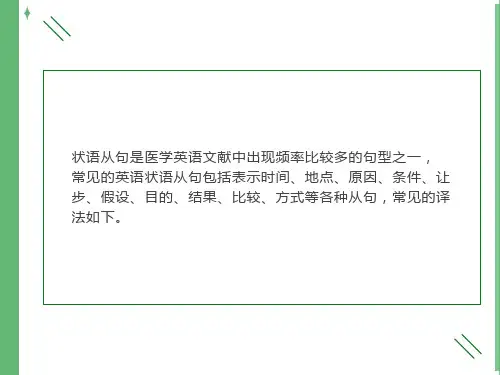
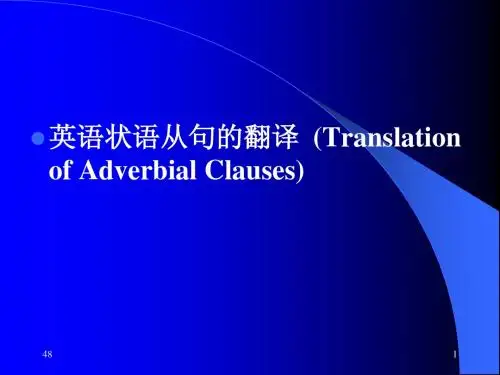
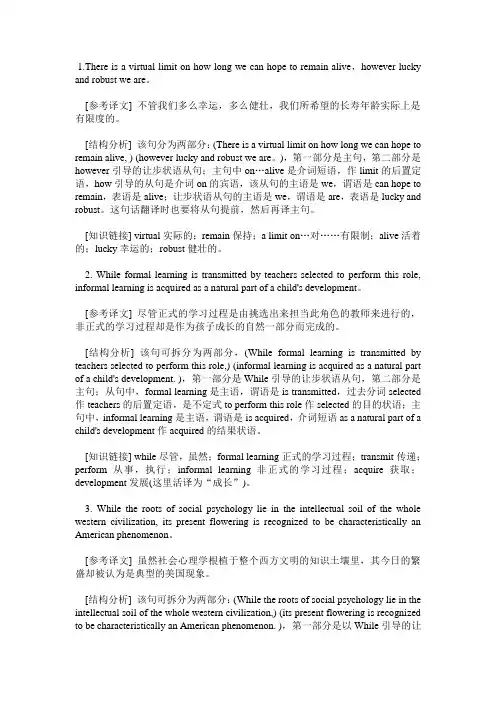
1.There is a virtual limit on how long we can hope to remain alive,however lucky and robust we are。
[参考译文] 不管我们多么幸运,多么健壮,我们所希望的长寿年龄实际上是有限度的。
[结构分析] 该句分为两部分:(There is a virtual limit on how long we can hope to remain alive, ) (however lucky and robust we are。
),第一部分是主句,第二部分是however引导的让步状语从句;主句中on…alive是介词短语,作limit的后置定语,how引导的从句是介词on的宾语,该从句的主语是we,谓语是can hope to remain,表语是alive;让步状语从句的主语是we,谓语是are,表语是lucky and robust。
这句话翻译时也要将从句提前,然后再译主句。
[知识链接] virtual实际的;remain保持;a limit on…对……有限制;alive活着的;lucky幸运的;robust健壮的。
2. While formal learning is transmitted by teachers selected to perform this role, informal learning is acquired as a natural part of a child's development。
[参考译文] 尽管正式的学习过程是由挑选出来担当此角色的教师来进行的,非正式的学习过程却是作为孩子成长的自然一部分而完成的。
[结构分析] 该句可拆分为两部分,(While formal learning is transmitted by teachers selected to perform this role,) (informal learning is acquired as a natural part of a child's development. ),第一部分是While引导的让步状语从句,第二部分是主句;从句中,formal learning是主语,谓语是is transmitted,过去分词selected 作teachers的后置定语,是不定式to perform this role作selected的目的状语;主句中,informal learning是主语,谓语是is acquired,介词短语as a natural part of a child's development作acquired的结果状语。

1.We would like your attention for three minutes while we explain the safety guidefor this flight.时间状从请大家用三分钟时间注意听讲,在我们解释这次航班的安全指南时。
*请大家用三分钟注意听讲一下这次航班的安全指南。
2.While we are serving meals, please move your seat back to its right place forsafety of the passenger behind you. 时间状从供应餐饮期间,为了你身后乘客的安全请大家将座椅移回原位。
3.If you need any help, please let us know by switching on the button next to thelight above your head. 条件状从如需帮助,请按你头顶上方靠灯的按钮让我们知道。
4.One of the most exciting moments will be in May when the Olympic flame istaken to the highest peak(山峰)in the world--Monut Qomolangma. 时间状从最令人兴奋的时刻之一将在五月,那时奥运火炬将被带到世界之巅--珠穆朗玛峰。
5.Ella and Hebe entered simply for the 10,000 yuan prize, while Selina wasencouraged by her young sister, who was then too young to take part. 转折对比,非限定性定从E和H的参赛只是奔着10000元的奖金而来的,而S的参赛却是受到了妹妹的鼓动,她妹妹那是还小,不能参赛。
五类状语从句的翻译一、时间状语从句1. 译成相应的时间状语1) 与原文顺序一致While she spoke, the tears were running down.她说话时,泪水直流。
2) 后置改前置Please turn off the light when you leave the room.离屋时请关灯。
2. 译成刚就的句式:When I reached the beach, I collapsed.我一游到海滩,就昏倒了。
3. 译成并列的分句:1) 译文前置They set him free when his ransom had not yet been paid. 他还没有交赎金,他们就把他释放了。
2) 后置不变I was about to speak when Mr. Smith cut in.我正想讲,史密斯先生就插嘴了。
二、原因状语从句1. 译成表因的分句:1) 因在果之前The crops failed because the season was dry.因为气候干旱,作物歉收。
2) 果在因之前She could get away with anything, because she looked such a baby.她能渡过任何风险,因为她看上去简直还像娃娃模样。
2. 译成因果偏正复句中的主句:Pure iron is not used in industry because it is too soft.纯铁太软,所以不用在工业上。
Because he was convinced of the accuracy of this fact, he stuck to his opinion.他深信这件事正确可靠,因此坚持己见。
3. 译成无关联词的因果关系并列分句:Where there is sound, there must be sound waves.哪里有声音,哪里就必有声波。
九大状语从句的英文表达1. 时间状语从句 (Adverbial clause of time):- When he arrived, everyone was already there.- I will call you as soon as I finish my work.2. 地点状语从句 (Adverbial clause of place):- Wherever she goes, she always takes her camera.- I will meet you at the park where we used to play.3. 原因状语从句 (Adverbial clause of cause/reason):- Since it"s raining, we should stay indoors.- The game was canceled because of bad weather.4. 结果状语从句 (Adverbial clause of result):- The car broke down, so we had to call for a tow truck. - He studied really hard, therefore, he got excellent grades.5. 条件状语从句 (Adverbial clause of condition):- If it rains, we will have to cancel the picnic.- Unless you hurry, you will miss the train.6. 目的状语从句 (Adverbial clause of purpose):- I am studying hard so that I can get into a good university.- He took extra classes in order to improve his English speaking skills.7. 方式状语从句 (Adverbial clause of manner):- She wrote the letter as if she was in a hurry.- They danced like nobody was watching.8. 比较状语从句 (Adverbial clause of comparison):- She is taller than I am.- He runs faster than his brother.9. 消息状语从句 (Adverbial clause of reported speech): - He told me that he would be late for the meeting.- She said that she was feeling tired.。
1.There is a virtual limit on how long we can hope to remain alive,however lucky and robust we are。
[参考译文] 不管我们多么幸运,多么健壮,我们所希望的长寿年龄实际上是有限度的。
[结构分析] 该句分为两部分:(There is a virtual limit on how long we can hope to remain alive, ) (however lucky and robust we are。
),第一部分是主句,第二部分是however引导的让步状语从句;主句中on…alive是介词短语,作limit的后置定语,how引导的从句是介词on的宾语,该从句的主语是we,谓语是can hope to remain,表语是alive;让步状语从句的主语是we,谓语是are,表语是lucky and robust。
这句话翻译时也要将从句提前,然后再译主句。
[知识链接] virtual实际的;remain保持;a limit on…对……有限制;alive活着的;lucky幸运的;robust健壮的。
2. While formal learning is transmitted by teachers selected to perform this role, informal learning is acquired as a natural part of a child's development。
[参考译文] 尽管正式的学习过程是由挑选出来担当此角色的教师来进行的,非正式的学习过程却是作为孩子成长的自然一部分而完成的。
[结构分析] 该句可拆分为两部分,(While formal learning is transmitted by teachers selected to perform this role,) (informal learning is acquired as a natural part of a child's development. ),第一部分是While引导的让步状语从句,第二部分是主句;从句中,formal learning是主语,谓语是is transmitted,过去分词selected 作teachers的后置定语,是不定式to perform this role作selected的目的状语;主句中,informal learning是主语,谓语是is acquired,介词短语as a natural part of a child's development作acquired的结果状语。
状语从句的译法1时间状语的翻译消费者购买商品实质上是在给不同的企业和产品投票Customers actually vote for products and companies when they make a purchase.我方建议这批货从总价中削减50%,相信你方会认为这样对我方是公平的I’m sure you will think it fair on our part when we suggest that the total value of the parcel should be reduced by 50%.2 原因状语从句的翻译The country’s economy has emerged from recession because the government adopted some flexible policies.因为政府采取了一些灵活措施,所以该国的经济已经开始复苏。
Because the winter is coming, many fashion stores start to sell warm clothes.因为冬天即将来临,所以时装店开始销售卸寒衣服了。
3让步状语从句Although we’ve raised our market share by 5%, the competition remains fierce.虽然我们的市场份额提高了5%,但目前的竞争依然激烈。
4目的状语从句To reduce loss and increase overall profits, the CEO told his product managers to get rid of all the dogs.为了减亏损,全面增加利润,公司的首席执行官告诉产品部的经理们销毁所有的次品。
5条件状语从句So if you should reduce your price by, say 5%, we might come to terms.要是你们答应降价,比如5%,我们达成协议。
状语从句翻译1 她说话时,泪水直流(while)1.Tearswas runnin g down her face whileshe talked.2 我正在吃饭的时候,她进来了。
(when)2.She came in when i was dinnin g.3 他结束讲话的时候,听众掌声雷动。
(as)3.The audien ce gave a roundof applau se as he endedhis speech.4 他将得到提升,因为他工作干得好(for)4.He will get promot ed for his hard workin g.5 理论之所以有价值,是因为它能给实践指出方向(becaus e)5.Theory has valuebecaus e it indica tes the direct ion for practi ce.6 为了正午以前赶到那里,我们很早就动身了(so that)6.We set out so earlythat we couldreachtherebefore the noon.7 如果没有他们的批准,我们不能开始这项工作。
(until)7.We can't get into the work untilthey approv e.1.他对她一见钟情。
了解越多,爱得越多。
1.He fell in love with her at the firstsight.The more he knowsher, the more he lovesher.2.虽然我很累,但因为做了一件好事而深感高兴。
2.Even though I am tired, but I am happybecaus e I did a good deed.3.违法的人都将受到惩罚。